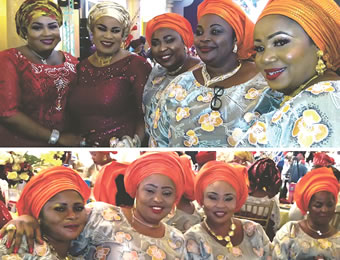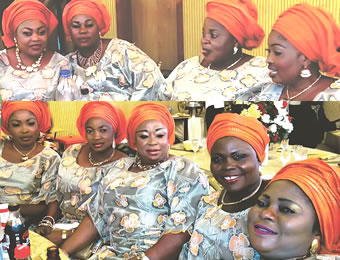ASO ebi, the ceremonial uniform often adorned by friends, families and well-wishers of celebrants, has come to stay as part and parcel of the frills and colours associated with social events in this part of the world. OLAIDE SOKOYA reports that despite the recession, the love for it has not diminished.
EVERY weekend, there is so much fun and excitement on the streets of major towns and cities in the country; a sign which, some may argue, means that Nigerians still manage to be happy, in spite of the economic recession in the land.
Along major roads and in taxis and buses, would-be guests are often seen making their way to venues of various social events, decked in their ceremonial uniform or better still aso ebi specially chosen for the special occasion.
In spite of the recession, caterers, those in rentals business and musicians still make some money, though it may be far between. However the biggest earners from the business of organising ceremonial events are the producers of Aso ebi fabric.
Aso Ebi is a very common sight at social events across the nation, most especially in the South West part of the country where wedding, burial, birthday and other ceremonies are not complete without the uniform.
Aso Ebi is mostly made of the Ankara fabric. Sometimes it could be aso oke and lace fabrics, including gele for the women. Loosely translated as ‘family uniform’, aso ebi is not only meant for family members, but also everyone related to the celebrants. When adorned it sets the wearers apart as “one big family” which is actually the reason for the uniform. The cost of Aso ebi ranges from as low as N1,200 to as much as N100,000 depending on the fabric and the quality.
However, despite the economic situation in the country, the love for the aso ebi has not waned in any way and though people may complain of not having liquid cash, they still go for it for different reasons.
At a recent wedding ceremony, though the bride’s mother is a teacher in one of the primary school in Oyo State and the groom’s parents are both civil servants in Osogbo, Osun State—states where workers are crying over unpaid salaries—that did not stop the celebrants from making the day their happiest as their friends and relations turned out in their hundreds adorning their aso ebi.
The big hall used for the reception, which was 2,000 capacity was full with guests wearing green lace fabric and orange gele aso ebi for both the traditional wedding on Friday and the wedding on Saturday by both families.
Those in aso ebi were asked to sit at the left side of the hall and were served food first, and given the several souvenirs ranging from pressing iron to bread toasters, power banks, cute jewellery boxes and beautiful towels. On the other side of the hall, those not in aso ebi watched in awe.
According to Madam Atolagbe, who did not want to reveal her full identity, she turned out in the aso ebi because the groom’s mother was her colleague at her place of work.
When Sunday Tribune asked Mrs Patricia Alawusa how much the clothes cost and how she was able to afford them despite not being paid her salary for months, she said: “We cannot say because the government did not pay our salary then we should deny ourselves our responsibilities to one another. The aso ebi was given to us in a way that it won’t affect us financially; we know how we do this among ourselves.”
Another guest at the wedding ceremony, Miss Oluwatoyin Adesanmi, also a civil servant, said: “Aso ebi is us, it is our culture and we’ve got to sustain it. As for me, it helps us to have more clothes and update our wardrobes with the latest fabric in town. Most, if not all, of my native wears are aso ebi, such that if I decide not to buy aso ebi again, I already have more than enough.”
Nigerians in the diaspora have also exported the aso ebi culture to other countries where they live. A London-based Nigerian, Miss Samson Kenume, in an interview with Sunday Tribune, said: “the situation is even worse abroad. Those who belong to one village meeting or the other spend a lot of money acquiring new wrappers for their various associations.
“We pay as much as £200 or more to buy aso ebi just to belong and to show off to others that one is doing well. I buy when I can afford it but I don’t like being under any pressure to do so.”
For Mrs Kikelomo Adeleke, identifying with celebrants with the adornment of Aso ebi is a good idea and should not be condemned because of its financial commitment which some people may argue drills a hole in their pockets.
“As for me, aso ebi gives me a sense of belonging at the occasion where it is used. I’ve had souvenirs that are more than the extra charge on the original cost of the fabric. For me that is getting more value than what I paid for. For occasions where the cost of aso ebi is outrageous, I’m sure they would have other variations that are affordable. If one can’t afford the lace material, one can go for the brocade, or ankara or just the aso oke for the cap or headgear (gele). One does not have to incur a debt to get the aso ebi. For me, I only buy the affordable ones,” she said.
If Nigeria is in recession, Mrs Adewumi Adeoye, a teacher, believes an economic system has already been built around aso ebi as celebrants or people around them have chosen to make a business which they must profit from.
“In the past, one could join any party without an invitation card as a complete stranger and expect to be served food and drinks and given gift items. That trick may not work these days because celebrants now look out for their own guests. Unrecognised guests looking for free food are politely asked to leave by fierce-looking guards.
“For many, a party these days is even a fund-raising event, carefully designed to generate profit. A special economy has developed around the aso ebi tradition. For example, sometimes, the celebrant shamelessly inflates the cost of the material, and you are expected to oblige,” she said.
WATCH TOP VIDEOS FROM NIGERIAN TRIBUNE TV
- Relationship Hangout: Public vs Private Proposals – Which Truly Wins in Love?
- “No” Is a Complete Sentence: Why You Should Stop Feeling Guilty
- Relationship Hangout: Friendship Talk 2025 – How to Be a Good Friend & Big Questions on Friendship
- Police Overpower Armed Robbers in Ibadan After Fierce Struggle







